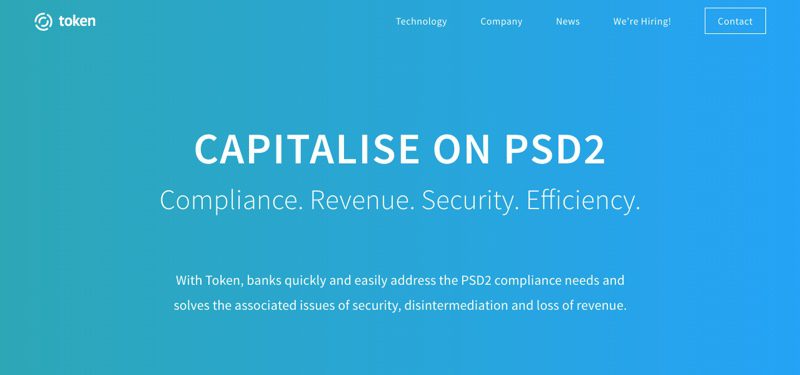Banking and Payments
Finovate/FinDEVr veteran Token (F15; FD15) is leveraging its digital payments technology to help banks meet new requirements when it comes to third party data access. The company announced last month that it has signed a memorandum of understanding with fellow Finovate/FinDEVr veteran Fidor Bank (F11; FD16) that will make Token’s software available within Fidor AG’s digital banking and open community middleware technology, Fidor OS. For Fidor, the partnership will help it fulfill PSD2 requirements in Europe that mandate FI’s provide third party providers with access to customer data. “Our platform can be used as a springboard to generate revenues from PSD2 and XS2A,” Token founder and CEO Steve Kirsch explained. “In the longer term, it can be applied to enhance the security, speed, cost, and efficiency of a massive range of transaction-based banking functions which currently rely on traditional legacy process.” Kirsch included billpay, international money transfers, and e-commerce, as examples.
Meanwhile, neobank Tandem finished off 2016 with a $42.8 (£35) million “initial commitment” from the House of Fraser. The funding comes as part of an agreement that will have the U.K. based retailer offering its shoppers financial services via Tandem. House of Fraser currently offers consumers credit and loyalty cards; it said it will detail how it will use its new relationship with Tandem in the first half of 2017. Tandem currently offers savings accounts and is expected to add current accounts and credit cards later this year.
FI/fintech partnerships and investments such as the above notwithstanding, the U.S. Office of the Comptroller of the Currency (OCC) questions the ability of banks to respond “to the evolving demands for financial services and the entrance of new competitors, such as out-of-market banks and fintech firms” in its semi-annual risk report. At the same time, the OCC is doing what it can to make it easier for fintech companies to become a part of the regulated federal financial system. This includes a new chartering system announced in December, that would, among other things, enable fintech companies to operate across state lines.
 Wealth Management and Investing
Wealth Management and Investing
Gender-oriented financial advisory just picked up another win. The first licensed robo advisor in Singapore, Miss Kaya, was unveiled this week. Developed by former hedge fund manager, Gina Heng, the technology is designed to move beyond the “jargon, financial lingo, analogies” of investing and offer instead a solution that is less “daunting for the modern woman,” Heng explained. The platform includes educational resources on investing and financial planning, budgeting tools, and an e-wallet linked to a Miss Kaya debit card.
Blockchain
The fifth largest private sector bank in India, Yes Bank, announced that it successfully deployed blockchain technology to digital vendor financing. Yes Bank used Hyperledger technology supported by IBM (and demonstrated at FinDEVr Silicon Valley 2016 last fall) to enable its client Bajaj Electricals to digitize both fund discounting and disbursal to vendors.
Using blockchain to facilitate corporate payments, BNP Paribas reported that it has deployed the technology to process real-time payments in a variety of currencies for a pair of corporate clients – Amcor and Panini Group. The effort, part of BNP Paribas’ Cash Without Borders pilot project, is designed to provide an example for corporate treasury managers considering blockchain technology. “This proof of concept demonstrates that blockchain technology offers real opportunities to considerably improve our offer,” Head of Transaction Banking EMEA at BNP Paribas Jacques Levet said.
Putting their bucks where the blockchain is, a number of big banks are putting $18 million behind blockchain technology startup, Axoni. Among the FIs participating in the company’s Series A are Goldman Sachs, J.P. Morgan, Thomson Reuters, and Wells Fargo, which led the round along with Euclid Opportunities. Axoni now has more than $20 million in total funding. The company’s distributed ledger technology has been sought after by Wall Street firms, looking to use the blockchain platform for credit default swaps.
Lending
British Business Bank (BBB) gave UK P2P lender, Funding Circle, another $42 (£40) million to lend to small businesses. Funding Circle has received a total of $84 (£80) million from the BBB, which provided the lender with an earlier, $48.7 (£40) million infusion of capital in 2014. Funding Circle says more than 10,000 businesses have benefited since March 2013, and more than $5.2 (£5) million in interest generated “on behalf of the UK taxpayer.”
InsurTech
Auto financing is one of the areas where insurtech has held the most promise in terms of innovation. Idea Bank of Poland has unveiled a pay-as-you-drive financing solution that uses GPS technology to determine payment. The solution, Happy Miles, sets a rate per kilometer based on vehicle type. GPS tracks the distance, sends the data to be processed, and the borrower gets a bill each month for the amount due. Happy Miles is currently just for auto loans. But the company sees expansion into financing for trucks, as well as agricultural machinery and construction equipment and vehicles.
“What is important, in Poland, due to tax regulations, a popular and economical form of car financing is leasing. It’s like the market’s asking us to be transformed,” Idea Bank executive Dominik Fajbusiewicz said. Idea Bank has also earned attention for its fleet of mobile ATMs operating in 12 of Poland’s largest cities, including Warsaw.
Speaking of Europe, remember that FinovateEurope is right around the corner. Join us in London, February 7 and 8 for two days of the latest in fintech innovation from the Europe and around the world.
